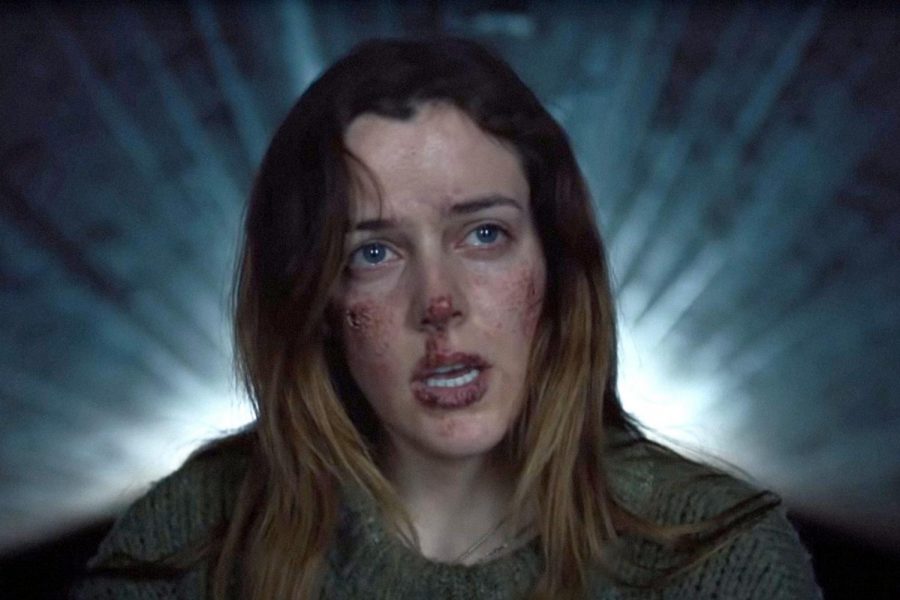“The Lodge” Gets Left Out In The Cold
One of the surprising turnarounds of the last decade was the horror genre’s redemption. Films like “Get Out” and “It Follows” went a long way in rehabilitating the genre for general audiences. While it’s nice to see that horror is again engaging complex social and political issues, it’s still hard to make a good movie.
“The Lodge” is a product of this horror redemption, trying to tackle difficult subjects like religion and suicide in a mature way. Unfortunately, none of it comes together properly.
“The Lodge” gets painfully close to being a memorable, well executed horror movie. Gracie (Riley Keough), the survivor of a Christian cult’s mass suicide, ends up stranded in her fiancé’s winter vacation home, along with his two children.
Their strained relationship is further tested by recent and more well-established traumas. Increasingly strange events drive things to a breaking point, especially as their trials start to get spiritual.
Even as American cinema gravitates towards longer running times, the “slow burn” approach to storytelling is getting rarer. As a result, it feels almost nostalgic for “The Lodge” to drag out every second of its hour and 48 minute running time.
Unfortunately, the film also lacks subtlety. Deeply flawed but uncomplicated characters populate a world made of intentionally dated and foreboding sets. The plot developments are similarly raw and abrupt, to the point that “The Lodge” often ends up as a horror-tinged dark comedy, even if it’s meant to be deadly serious.
The camerawork follows similar conventions, best shown by the reliance on zoom in shots. It’s not only distracting but unnecessary. The unending sense of claustrophobia is one of the few things “The Lodge” has in its favor.
However, the camera drifts in and out and detracts from that feeling. By contrast, the fixed camera angles and dark lighting are competently used, turning tame scares into something more chilling.
Admittedly the camerawork is one of the stronger aspects of the film, especially when compared to the imagery. The seemingly endless winter storms and haunting shots of creaky houses work well, but the glut of gothic Christian symbolism is poorly handled. That’s partially why the the film’s handling of traumatic religious upbringings fails, aside from weak scripting.
The film definitely shows that faith affects people even after they turn away from it, but it fails to offer anything insightful past this assertion.
The religious symbolism in “The Lodge” is offset by another heavy-handed motif. The plot is regularly interrupted by cutaways to disturbing, prophetic visions of a doll house.
These segments disrupt the flow, even if they play into the film’s oppressive atmosphere. In the dollhouse’s defense, it at least mirrors the source of the horror: how seemingly subjective reality is for the characters as well as the viewer.
If nothing else, “The Lodge” has strong audio design. Even mundane noises are heightened to be scarier than whatever is on screen. Actions like packing luggage and making breakfast are turned into harrowing experiences.
The long, uncomfortable silences that dominate the film also build tension. Unfortunately, the soundtrack lacks that subtlety, as it goes for a mix of clashing styles with some more questionable religious allusions.
In terms of the writing, the characters are pitiable but not particularly likable. Poor performances from the actors only make this worse. Gracie, who is at once the protagonist and antagonist, is the exception. Keough convincingly portrays her as a victim of circumstance, both in the past and the present.
Her reactions to inhumane circumstances feel convincing, no matter how exaggerated they might be. Even at her lowest, Gracie is strangely sympathetic, bringing judgement to a world that just won’t leave her alone.
Unfortunately, I suspect “The Lodge” intended for things to be a little more complicated than that. From what I can tell, the film wants to be a story about deeply hurt people too young and vulnerable to understand their actions. Instead, “The Lodge” comes off as a perverse revenge narrative, in which Gracie’s horrible acts almost feel justified.
You can blame that on unsympathetic characters, absurd scenarios and the film as a whole. “The Lodge” brings more to the table than most in the horror genre but sends the wrong messages. At the very least, I do want to see Riley Keough in a better thriller.









































































































































































































